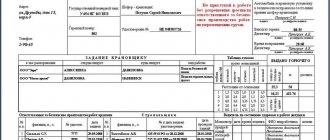Requirements for the dispatcher. Rights, duties, responsibilities
The transport dispatcher plays the role of a liaison in the work of the transport company. The bulk of the work is related to the distribution of transport according to requests, as well as resolving issues and problems that arise during the movement of vehicles. The main organizational document regulating the work of a transport dispatcher is his job description.
The dispatcher of automobile and urban ground electric transport is subject to one of the following requirements:
a) a diploma of education of at least secondary vocational education in a specialty included in the enlarged group 23.00.00 “Engineering and technology of land transport” (subgroup “Organization of transportation and management of transport, profession code 23.02.01”;
b) availability of a diploma of secondary vocational education in specialties not included in the enlarged group 23.00.00 “Engineering and technology of land transport”, and a diploma of additional professional education under a professional retraining program with the qualification of a dispatcher of automobile and urban ground electric transport.
As part of the staffing schedule, the dispatcher is included in the category of specialists. He is appointed to the position by the director of the company by order.
The dispatcher is directly subordinate to the garage manager, chief engineer and senior mechanic.
The main task of a transport company dispatcher is the high-quality organization of the work of transport and drivers on the line, as well as control over compliance with routes and the progress of transportation work in general. As part of this task, the transport dispatcher performs a huge list of functions .
1. Works with drivers and interacts with other personnel of the company or fleet:
— organizes the work of drivers;
— controls the operation of control points on the line;
— conducts briefings with drivers on transportation issues and route features.
2. Organizes cargo transportation:
— maintains and organizes communications with the company’s clients on issues of transportation and route organization;
— exercises control over bus terminals and bus stations for the purpose of high-quality and efficient route management;
— controls and prevents vehicle downtime;
— controls traffic schedules and timetables, if necessary, promptly redistributes transport when the intensity of passenger flows changes;
— organizes special and additional flights;
— promptly resolves conflicts and problematic situations on routes, preventing disruption of traffic flows, and also takes timely and effective measures to eliminate them;
— keeps records of completed transportation, and also exercises timely control over the progress of cargo transportation;
— controls the unloading and loading of vehicles, as well as the technical condition of access roads;
— controls issues of ensuring transportation safety;
— informs management about cases of illness of drivers and personnel, cases of injuries and failure of vehicles;
— works with automated systems and devices for monitoring cargo transportation.
To accurately perform his duties, the dispatcher must maintain the following documentation :
- waybills;
— calculations of technical and operational characteristics;
— log of applications and tasks for cargo transportation;
— a log of incidents, and also compiles reports and operational reports of accidents that occurred, incidents that occurred during the shift;
— checks the correctness of execution of route sheets, as well as documents on completed transportation;
- duty log;
— journal of accounting and movement of waybills;
— log of special transport work;
— driver briefing logs;
— a log of transport entering the line and returning;
— compiles and submits reporting documentation to management;
— controls the correctness of execution of accompanying documentation for cargo.
In addition, the dispatcher must know :
— basic provisions of transport and labor legislation;
— regulatory documents on the organization of vehicle traffic control;
— road map and addresses of organizations in the service area;
— basics of traffic rules;
— transportation rules;
— distances and transportation routes, condition of the road surface along the route.
The dispatcher is a very important position for any enterprise where it is provided. After all, the correctness and clarity of this person’s actions determines whether the cargo will arrive on time, whether the machine will reach the line, whether the equipment will function correctly, etc.
Because of errors, entire production can be stopped or equipment downtime can occur, which entails losses for the enterprise.
Therefore, the dispatcher can be held accountable for the following:
- For failure to fulfill one’s duties (including improper performance) specified in the job description.
- If in the course of his work he committed an offense (violation of safety regulations), liability for which is provided for by administrative, civil and criminal legislation.
- If the dispatcher caused property damage to his organization.
All sanctions are regulated by civil and labor laws. But if people were injured as a result of the dispatcher’s actions, then criminal law comes into play.
In addition to responsibility, the dispatcher also has rights. Dispatcher rights include:
— participation in discussions of issues that directly relate to his duties. He participates in meetings where issues of improving the operation of the enterprise are discussed. Can offer his ideas in this area;
— the dispatcher has the right to demand and receive all the necessary information and documents that he will need for his work;
— give directions and instruct drivers before the trip, distribute cargo transportation tasks among drivers;
— check the quality of implementation of previously issued instructions.
During the performance of functional duties, the transport dispatcher must be guided by the following regulations:
Code of the Russian Federation on Administrative Offenses dated December 30, 2001 No. 195-FZ
Letter of the Federal Tax Service of the Russian Federation dated March 29, 2006 N GI-6-17-337 “On fuel consumption standards (together with Letter of the Ministry of Transport of the Russian Federation dated March 21, 2006 N 4050-208)”
Resolution of the State Statistics Committee of the Russian Federation dated November 28, 1997 N 78 “On approval of unified forms of primary accounting documentation for recording the work of construction machines and mechanisms, work in road transport”
Resolution of the State Standard of the Russian Federation dated January 30, 2004 N 4 “On national standards of the Russian Federation”
Resolution of the Ministry of Labor of the Russian Federation dated May 12, 2003 N 28 “On approval of inter-industry rules for labor protection in road transport”
Order of the Ministry of Finance of the Russian Federation dated January 16, 1998 N 2n “On the amount of the insurance tariff for compulsory personal insurance of passengers of air, railway, sea, inland water and road transport”
Order of the Ministry of Automobile Transport of the RSFSR dated March 30, 1987 N 44 “On the introduction of temporary instructions and recommendations for ensuring the implementation of flights on bus routes”
Order of the Ministry of Automobile Transport of the RSFSR dated December 31, 1981 N 200 “On approval of the Rules for organizing passenger transportation by road transport”
Order of the Ministry of Transport of the Russian Federation dated September 18, 2008 N 152 “On approval of mandatory details and the procedure for filling out waybills”
Order of the Ministry of Transport of the Russian Federation dated August 20, 2004 N 15 “On approval of the Regulations on the peculiarities of working hours and rest time for drivers”
Order of the Ministry of Transport of the Russian Federation dated June 22, 1998 N 75 “On approval of qualification requirements for specialists of legal entities and individual entrepreneurs transporting passengers and cargo by road” (Registered with the Ministry of Justice of the Russian Federation on July 22, 1998 N 1563)
Order of the Ministry of Transport of the Russian Federation, the Ministry of Labor of the Russian Federation dated March 11, 1994 N 13/11 (as amended on May 11, 2000) “On approval of the Regulations on the procedure for certification of persons holding positions of executive managers and specialists of transport enterprises” (Registered with the Ministry of Justice of the Russian Federation on April 18, 1994 N 548 )
Standard instruction No. 1 on driver labor protection when transporting people by truck (approved by the Ministry of Transport of the Russian Federation on March 11, 1993)
Standard instruction N 19 on labor protection when towing, coupling and uncoupling cars or a car and a trailer TOI R-200-19-95 (dated 02/27/1996 N 16)
Standard instruction No. 20 on labor protection when moving around the territory and production premises of the ATP. TOI R-200-20-95 (dated 02/27/1996 N 16)
Federal Law of May 4, 2011 N 99-FZ “On licensing of certain types of activities”
Federal Law of March 6, 2006 N 35-FZ “On Countering Terrorism”
Federal Law of December 10, 1995 N 196-FZ “On Road Safety”
Order of the Ministry of Transport of the Russian Federation dated 08.08.1995 N 73 “On approval of the Rules for the transportation of dangerous goods by road”
Order of the Ministry of Education and Science of the Russian Federation dated January 8, 1997 No. 2 “On approval of the Regulations on ensuring the safety of passenger transportation by buses”
VKontakte
https://youtu.be/Cn_9FxS_Ztc
Job responsibilities of a senior road transport dispatcher
General provisions
- The road transport dispatcher reports to the head of the dispatch unit.
- A road transport dispatcher is accepted into his position and also dismissed from it by the appropriate decree of the head of the company, on the recommendation of the head of the dispatch unit.
- During the absence of a road transport dispatcher, his work duties are performed by another specialist from the dispatch unit, selected by his supervisor.
- A candidate for this position must meet the following qualification standards:
- secondary specialized specialized education;
- 2 years of experience in operational transport management.
- A road transport dispatcher must have knowledge in the following areas of activity:
- safety standards and traffic regulations affecting operational transport management issues;
- standards for transporting passengers and different types of baggage;
- basic tariffs applied by the company, taking into account the peculiarities of pricing by distance, type of cargo and other factors;
- standards for completing, checking and maintaining waybills, as well as other relevant documentation;
- rules for assessing the performance of drivers;
- the condition of the road network used by the company's vehicles;
- features of various brands and types of machines used by the company;
- the current situation with traffic congestion, as well as forecasts for its change;
- traffic schedule of the company's vehicles and its main stopping points;
- main competing companies, their routes and features;
- regulations governing the work of company drivers;
- standards for checking the condition of vehicles before entering the highway;
- principles of handling relevant communication systems;
- technical and fire safety standards, as well as labor discipline.
- The road transport dispatcher is guided by:
- current regulations and laws;
- company documentation;
- provisions of this instruction.
Functions
The road transport dispatcher performs the following job duties:
- Monitoring the performance of the company’s transport and drivers on its routes.
- Providing prompt advice to drivers on the current state of transport and roads on their routes.
- Maintaining contact with clients, bus terminals, bus stations, line dispatcher points to resolve and prevent possible problematic situations with the company’s transport.
- Monitoring the situation with downtime of the company's vehicles.
- Monitoring the situation with the execution of operational orders for the company’s transport services.
- Providing management with operational data on the location and movement of the company's vehicles.
- Monitoring the correctness of the company's vehicle movement schedule.
- Organization of urgent excess routes and flights if necessary.
- Organization of redistribution of transport units along routes and highways.
- Participation in activities to eliminate disruptions in the operation of the company’s vehicle routes.
- Informing management about problematic issues in their area of responsibility.
- Maintaining appropriate document flow according to company rules.
Responsibility
The road transport dispatcher is responsible in the following cases:
- For violations of current norms and laws committed in the workplace - in accordance with sections of administrative, criminal, and labor legislation.
- For failure to perform job functions specified in labor documentation - in accordance with sections of labor legislation and company standards.
- For damage caused to the company through his fault - within the limits given in the relevant articles of legislation.
Rights
The road transport dispatcher is vested by the company with the following rights:
- Make proposals to the management of the dispatch unit to improve processes in their area of responsibility.
- Receive from company specialists the data required in your work.
- Require the management of the dispatch unit to create the conditions necessary for the effective conduct of its activities.
- Receive agreed upon payments and benefits as planned KPIs are achieved.
- Get acquainted with draft management proposals on issues affecting your area of responsibility.
Responsibility: The road transport dispatcher is personally responsible for:
- Inconsistency of the decisions he made with the current legislation of Ukraine.
- Improper performance or failure to fulfill one’s official duties as provided for in this instruction - within the limits determined by the current labor legislation of Ukraine.
- For offenses committed in the course of carrying out their activities - within the limits determined by the current administrative, criminal and civil legislation
- Giving false information about the status of the work being performed.
- Violations of the requirements of laws and other legal acts on labor protection.
VI. Relationships: For all questions related to the performance of his official duties, he addresses his immediate supervisor. VII.
Compliance with labor discipline by drivers. 566 General corporate standards The activities of the Dispatcher are regulated by general corporate standards reflected in the following documents: 566.1 Internal labor regulations 66.8 Regulations on the Transport Department; 566.9 This job description.
567 Rights The senior dispatcher has the following rights necessary to perform his functional duties: 8.3 Receive information necessary to carry out his activities from all structural divisions and officials of XXX within his competence. 8.4 Make proposals to senior management on issues related to their competence. 8.
5 Exercise other powers in accordance with this Job Description.
Ensures control and accounting of completed cargo transportation and takes measures to promptly eliminate failures in transport processes, excess downtime at points of loading and unloading vehicles, as well as loading empty vehicles in the same direction. 3.14.
Job descriptions of a vehicle dispatcher Rights The chief dispatcher has the right to: 4.1. Act on behalf of the department, represent the interests of the enterprise in relations with the structural divisions of the enterprise, organizations and authorities on issues within its competence. 4.2.
4.3. Submit proposals for improving the activities of the enterprise (department) for consideration by management. 4.4.
2.2. Attention: Methodological guidance for dispatching services of production divisions of the enterprise. 2.3. Organization of work to improve the qualifications of dispatch service workers. 2.4.
It is important to ensure healthy and safe working conditions for subordinate workers, monitoring their compliance with the requirements of legislative and regulatory legal acts on labor protection. III. Job responsibilities The chief dispatcher of the enterprise is obliged to: 3.1.
Ensure the rhythmic operation of the enterprise and uniform production, performance of work in accordance with production programs, contractual obligations, calendar schedules and daily tasks. 3.2.
The dispatcher of a motor transport enterprise reports directly to [indicate the position of the head of the structural unit]. 1.7. During the absence of a dispatcher of a motor transport enterprise (illness, vacation, business trip, etc.), his duties are performed by a person appointed in the prescribed manner, who bears full responsibility for their proper performance.
2. Functions 2.1.
The dispatcher of a motor transport enterprise is entrusted with the implementation, using computer technology, communications and communications, of operational regulation of the progress of the activities of a motor transport enterprise or its divisions in accordance with production programs, plans and shift-daily assignments. 3.
- The procedure for registration and processing of waybills.
- Traffic Laws.
- Fundamentals of labor legislation.
- Rules and regulations of labor protection, safety, industrial sanitation and fire safety.
- IV. Rights: The road transport dispatcher has the right:
- Get acquainted with the draft decisions of the enterprise management concerning its activities.
- Submit proposals for improvement of the organization and methods of work performed by the enterprise management for consideration.
- Require drivers to undergo daily pre-trip and post-trip medical examinations.
- Report to the head of the department about identified signs of alcohol or drug intoxication, or deterioration in the health of drivers.
We invite you to familiarize yourself with: Accounting policy for basic and unified income, combined sample
-sections
Knowledge of the basics of labor legislation, knowledge of resolutions, orders, orders and other regulatory documents of higher authorities relating to the production and economic activities of ATP, knowledge of the charter of road transport, rules for the transportation of goods and passengers by road, rules and regulations on labor protection, safety and fire safety.
570 Glossary of special terms and abbreviations Term, abbreviation Definition of term, abbreviations 8.1 Maintenance Transport department 8.2 TB Safety precautions 8.3 Fuel and lubricants 8.4 Commodities and materials Inventory assets 8.5 ND Regulatory document 8.6 Vehicle Vehicle 8.7 WABC Automated information system for commodity and financial accounting 8.
A well-drafted job description requires that job responsibilities be described in as much detail as possible, since detailing job functions makes the employee’s work easier and ultimately improves labor productivity.
- Responsibility of the employee This section specifies the responsibility of the employee. At the same time, the employer must not forget that the law prohibits the internal documents of the organization from establishing liability stricter than that provided for by the Labor Code.
- Education and other skills required by a dispatcher for work The Unified Qualification Directory of Employee Positions lists the requirements for applicants for the position of a vehicle dispatcher as higher or secondary specialized education.
What a dispatcher should know
The job description of a transport dispatcher implies that the specialist has a higher education in a technical or engineering-economic field. In this case, the applicant is hired even without experience.
There is no escape from motor transport in modern life. City and intercity routes, trips around the region, to resort areas and bus excursions - no other transport can handle so many people and routes. The work of route vehicles is strictly regulated and worked out to the smallest detail.
Dispatchers play an important role in the functioning of this system. This article explains who a dispatcher is, the job description of this specialist, his rights, responsibilities and functions in the workplace. What is required to work in this industry, and how to organize your activities correctly?





